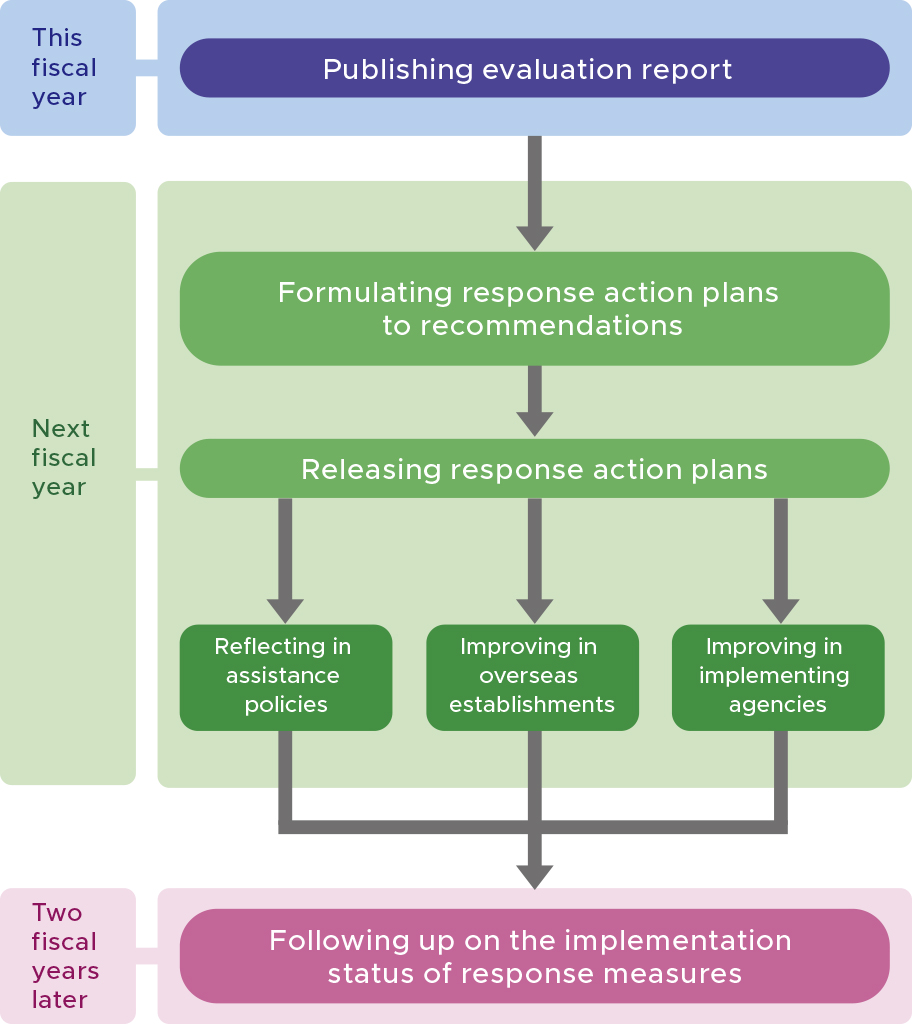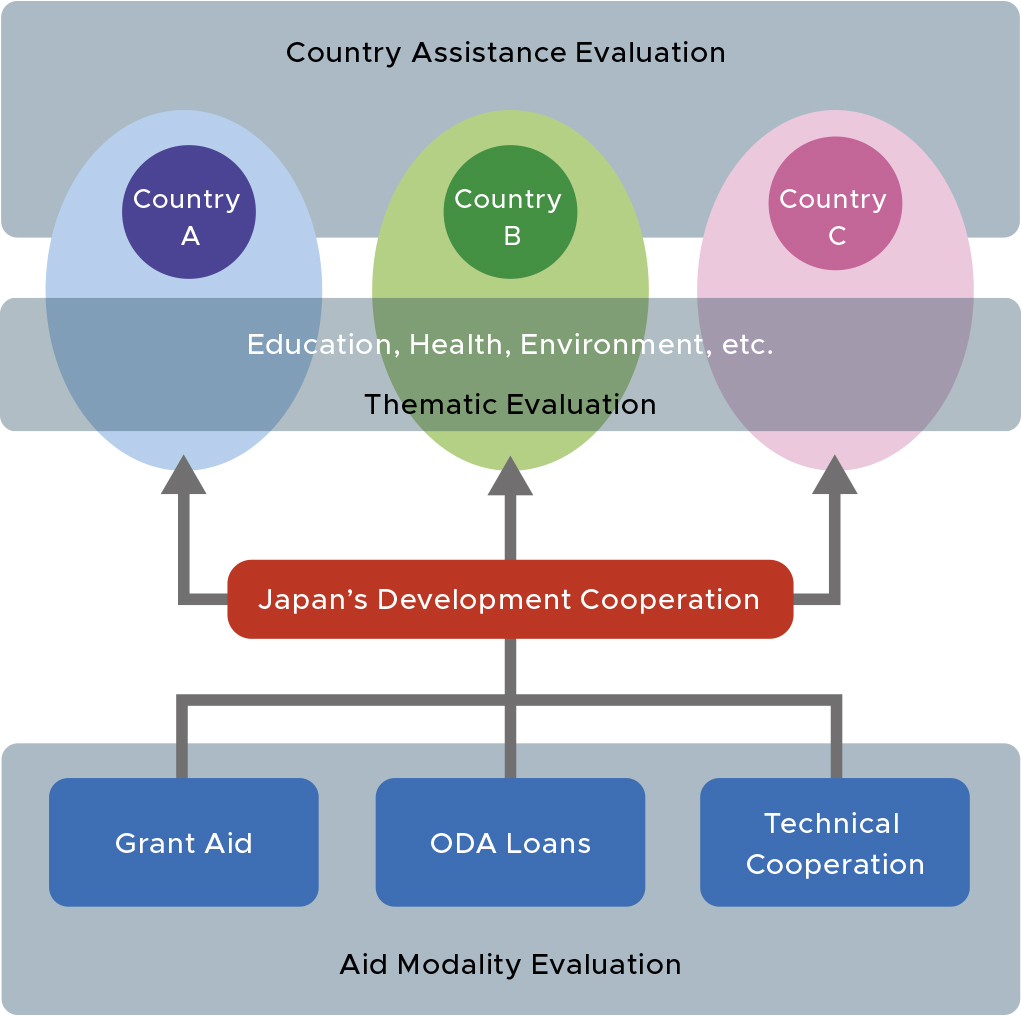What is ODA evaluation?
Japan conducts development cooperation for developing countries, using Official Development Assistance (ODA) in order to contribute to the peace, stability, and prosperity of the international community.
ODA evaluation is a systematic assessment of the implementation and effects of ODA.
ODA evaluation has two objectives: to improve ODA management and to strengthen public accountability. MOFA aims to enhance the efficiency and effectiveness of ODA by investigating its implementation and effects and to gain public understanding and support by disseminating the evaluation results and improving transparency.
Structure of the Implementation Process
The Ministry of Foreign Affairs (MOFA) is responsible for planning and formulating ODA policies, while the Japan International Cooperation Agency (JICA) is mainly responsible for implementing individual projects. MOFA and JICA collaborate on ODA evaluation by dividing their roles.
Japan has steadily conducted ODA evaluation since 1975, prior to the implementation of the Government Policy Evaluations Act (GPEA) in 2002. Japan has developed an evaluation framework in collaboration with other international ODA institutions, including the Development Assistance Committee of the Organization for Economic Co-operation and Development (OECD-DAC).
MOFA primarily evaluates ODA policy, commissioning to third parties, such as external experts and consultants from the private sector. Meanwhile, JICA evaluates individual projects which it is responsible for their implementation.
MOFA also provides assistance aiming for evaluation capacity development in developing countries.
This annual report presents MOFA’s ODA evaluations, aside from evaluations based on the GPEA.
Utilization of ODA Evaluation Results

It is essential that evaluation results and recommendations obtained from ODA evaluations are utilized by MOFA and JICA. They must be reflected in future policy making and project implementation.
Stakeholders in MOFA and JICA receive evaluation results and recommendations from evaluators and propose response action plans. One year later, MOFA checks the implementing status of the response actions and publicizes the results in MOFA’s ODA annual reports.
Through this process, MOFA aims to improve ODA management and promote public accountability.
Evaluation Targets

MOFA’s ODA evaluation can be classified according to the focus of evaluation. In Country Assistance Evaluation, development cooperation policy is evaluated for a specific developing country such as the Republic of Angola, the Republic of Indonesia, the Republic of Costa Rica, and the Republic of Nicaragua. In Thematic Evaluation, a specific theme is evaluated, such as education, health, and environment. In Aid Modality Evaluation, a particular modality is evaluated, such as technical cooperation and grant aid.
Furthermore, since FY 2017, MOFA has been evaluating individual development cooperation projects implemented by MOFA.
Evaluation Viewpoints / Evaluation Criteria
MOFA’s ODA Evaluation Criteria (third-party evaluations) under Development and Diplomatic Viewpoints are as follows:
1 Evaluation from Development Viewpoints
Through ODA evaluation, MOFA examines the extent of contribution to the development in recipient countries (Development Viewpoints) and the impacts on Japan’s national interests (Diplomatic Viewpoints) achieved by Japan’s ODA.
MOFA has set the criteria on the right, suitable for evaluating Japan’s overall ODA policy based on the OECD-DAC’s five evaluation criteria recognized internationally (relevance, effectiveness, efficiency, impact, and sustainability). Under each criterion, recommended evaluation questions are provided.
Relevance of Policies
How relevant is the ODA policy to Japan’s high-level policy, a partner country’s need, and internat ional priority issues? How outstanding is Japan’s ODA among other donors?
Effectiveness of Results
What results has the ODA produced? What levels of effect and impact has it shown?
Appropriateness of Processes
How appropriate was the policy-making and implementing process? Was effective donor coordination undertaken?
2 Evaluation from Diplomatic Viewpoints
Diplomatic Importance
How is Japan’s ODA important in international efforts to solve global priority issues and for Japan’s security and prosperity and bilateral relations?
Diplomatic Impact
How has Japan’s ODA contributed to Japan’s presence in international society, its security and prosperity? How has Japan’s ODA enhanced bi lateral relat ions with a par tner country?
